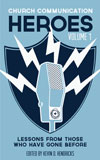Martin Luther King Jr. is perhaps the greatest champion for social change in 20th century America. He was also a Baptist minister.
He led a congregation, like many of you.
He sat through church business meetings, like many of you.
He worked to share the story of the gospel with his community, like many of you.
It’s somewhat revisionist and a little demeaning to call his work marketing, but in some small ways it was. He shared a message with his community and nation that ultimately spoke of the gospel story of freedom and redemption. He obviously didn’t use postcards and Facebook and sermon graphics, but he did use marches and rallies and non-violent protest.
He spoke of the power of creativity in finding solutions:
“So the question is not whether we will be extremists, but what kind of extremists we will be. Will we be extremists for hate or for love? … Perhaps the South, the nation and the world are in dire need of creative extremists.”
“Almost always, the creative dedicated minority has made the world better.”
I think we can claim Martin Luther King Jr. as a church communication hero. Granted he’s a hero in so many other, greater ways, but he was a master communicator. He put forth a vision and the people followed. He came up with creative solutions that confounded his opponents.
And isn’t that what we do? Find creative ways to connect people with a powerful truth?
I like the idea of Dr. King as church communication hero because what we do is not all discarded bulletins, forgotten Facebook updates or unappreciated graphics. The work we do is part of telling the greatest story ever told. Some of it is mundane things like fixing typos, choosing fonts or building sets (some of Dr. King’s work was undoubtedly mundane as well). But it’s also redemption. It’s life and death. It’s rallying people to the cause of justice. It’s the call to defend the immigrant, the orphan and the widow. It’s living out our faith in action as walking billboards, the greatest marketing we can do. The work we do is telling the same story that fueled the civil rights movement and drove the greatest American hero of the 20th century.
Maybe I’m overstating it and trying too hard to link church communication with greater glory. After all, who wouldn’t want Dr. King in their corner? But the fact is he was a pastor. He was in our corner. He had doubts and weaknesses just like the rest of us, but he also a gospel storyteller. We can either limit church communications to things that happen in an office behind a computer, or we can realize that communication is so much more. I don’t think the problem is overestimating church communication. I think our problem is that we underestimate church communication. And if we do that, we do a grave disservice to the greatest story ever told.
Martin Luther King Jr. was a courageous storyteller.
We have the same story to tell.
Let’s be just as courageous, just as creative, just as bold.
 More:
More:
- Learn more about heroes in our ebook, Church Communication Heroes Volume 1: Lessons From Those Who Have Gone Before.
- Check out other heroes in our Church Communication Heroes series.
- Martin Luther King Jr. Day: Why and how your church should celebrate, including free social graphics to share.
- See more of our posts on Martin Luther King Jr.





Andy Thomas
January 18, 2011
Great article, I totally agree. Where are the MLK’s of today?
Sheila
February 3, 2011
MLK not only put flesh onto a vision but he expressed that vision articulately and passionately. Because the vision was tangible, it drew people. His vision was much larger than the typical church vision of more believers; it focused on the impact (or end results). Maybe the church should be looking more at the impact and getting some tangible indicators – just as Dr. King had.
Kimberly
June 30, 2011
Great post… I like this line:
“I don’t think the problem is overestimating church communication. I think our problem is that we underestimate church communication.”
John Paul Todd
January 16, 2012
Your post of a year ago is still valid as we observe MLK Day one year later. Dr.King was a total package but the aspect of communicator in the Black tradition of preaching is a central part of that package. I have benefitted greatly on several books that treat linguistically the sermon of the Black tradition in America. One that does this specifically in relation to King is “King Came Preaching” by Dr.Mervyn Warren (IVP, 2001). I joyfully recommend it to anyone that wants to get a serious vision of the man whose ” highest purpose was to be a preacher of the gospel of Jesus Christ” (p.9, foreword, G.C. Taylor)